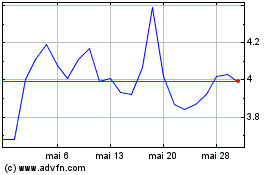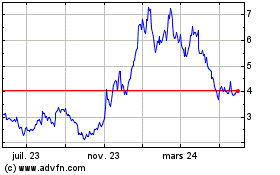Autolus Therapeutics announces a publication in Nature Medicine on obe-cel in Pediatric Acute Lymphoblastic Leukemia
06 Juillet 2023 - 1:00PM

Autolus Therapeutics plc (Nasdaq: AUTL), a clinical-stage
biopharmaceutical company developing next-generation programmed T
cell therapies, today announced a publication in Nature Medicine1
entitled: ‘Transcriptional hallmarks of persisting CD19 CAR T-cells
in children with leukaemia,’ describing new findings from the
original Obecabtagene autoleucel (obe-cel) study (CARPALL2) in
Pediatric B-cell Acute Lymphoblastic Leukemia.
Long-term CAR T cell persistence is associated
with durable responses in some cancers, including B-cell acute
lymphoblastic leukemia (B-ALL). Obe-cel, Autolus’ CD19 CAR, was
designed to maximize CAR T cell persistence by tuning the affinity
to CD19 to result in more physiological signaling.
The transcriptional mechanisms behind long-term
persistence of antigen-specific T cells are not fully understood.
The long-term persistence of obe-cel CAR T cells in patients allows
their isolation by flow-cytometric sorting from peripheral blood at
very late time-points (including several years) after infusion.
This has enabled researchers at University College London, working
in collaboration with the Wellcome Sanger Institute, to perform
detailed single-cell analysis on long-term persisting CAR T cells
from patients treated in the CARPALL study2, the first clinical
study of obe-cel in pediatric B-ALL.
Publishing her findings in Nature Medicine
today, Dr Sara Ghorashian described how long-term persistence was
associated with a particular T cell population which was CD4/CD8
double-negative, but expressed the transcription factor TOX and
Granzyme K. This phenotype emerged across all clones and subsets of
T-cells, suggesting that CAR T-cells converge transcriptionally to
this state to maintain persistence. This finding fits with the
newly described TPEX sub-population found in chronic viral
infections.
“Long-term CAR T cell persistence is required
for durable responses in B-ALL but is not well understood,” said
Dr Martin Pule, Chief Scientific Officer and Founder of
Autolus: “Dr Ghorashian has exploited the ability to
isolate obe-cel CAR T-cells from patients at late time-points to
further our understanding of which transcriptional states drive
long-term persistence. These findings will allow us to work towards
further refining CAR T manufacturing to favor these transcriptional
states.”
- Ghorashian, S. et al, Nature Medicine, 2023. DOI:
10.1038/s41591-023-02415-3
- Ghorashian, S. et al. Nat. Med. 25, 1408–1414 (2019).
DOI:10.1038/s41591-019-0549-5
About Autolus Therapeutics
plcAutolus is a clinical-stage biopharmaceutical company
developing next-generation, programmed T cell therapies for the
treatment of cancer. Using a broad suite of proprietary and modular
T cell programming technologies, the Company is engineering
precisely targeted, controlled and highly active T cell therapies
that are designed to better recognize cancer cells, break down
their defense mechanisms and eliminate these cells. Autolus has a
pipeline of product candidates in development for the treatment of
hematological malignancies and solid tumors. For more information,
please visit www.autolus.com
About obe-cel (AUTO1)Obe-cel is
a CD19 CAR T cell investigational therapy designed to overcome the
limitations in clinical activity and safety compared to current
CD19 CAR T cell therapies. Designed to have a fast target binding
off-rate to minimize excessive activation of the programmed T
cells, obe-cel may reduce toxicity and be less prone to T cell
exhaustion, which could enhance persistence and improve the ability
of the programmed T cells to engage in serial killing of target
cancer cells. In collaboration with Autolus’ academic partner, UCL,
obe-cel is currently being evaluated in a Phase 1 clinical trial
for B-NHL. Autolus has progressed obe-cel to the FELIX trial, a
pivotal trial for adult ALL.
Forward-Looking StatementsThis
press release contains forward-looking statements within the
meaning of the "safe harbor" provisions of the Private Securities
Litigation Reform Act of 1995. Forward-looking statements are
statements that are not historical facts, and in some cases can be
identified by terms such as "may," "will," "could," "expects,"
"plans," "anticipates," and "believes." These statements include,
but are not limited to, statements regarding the continued
development of Autolus’ obe-cel program, and the potential
application of new findings to the Company’s manufacturing and
development activities. Any forward-looking statements are based on
management's current views and assumptions and involve risks and
uncertainties that could cause actual results, performance, or
events to differ materially from those expressed or implied in such
statements. These risks and uncertainties include, but are not
limited to, the risks that Autolus’ preclinical or clinical
programs do not advance or result in approved products on a timely
or cost effective basis or at all; the results of early clinical
trials are not always being predictive of future results; the cost,
timing, and results of clinical trials; that many product
candidates do not become approved drugs on a timely or cost
effective basis or at all; the ability to enroll patients in
clinical trials; possible safety and efficacy concerns; and the
impact of the ongoing COVID-19 pandemic on Autolus’ business. For a
discussion of other risks and uncertainties, and other important
factors, any of which could cause Autolus’ actual results to differ
from those contained in the forward-looking statements, see the
section titled "Risk Factors" in Autolus' Annual Report on Form
20-F filed with the Securities and Exchange Commission on March 7,
2023, as well as discussions of potential risks, uncertainties, and
other important factors in Autolus' subsequent filings with the
Securities and Exchange Commission. All information in this press
release is as of the date of the release, and Autolus undertakes no
obligation to publicly update any forward-looking statement,
whether as a result of new information, future events, or
otherwise, except as required by law.
Contact:
Julia Wilson+44 (0) 7818
430877j.wilson@autolus.com
Susan A. NoonanS.A. Noonan
Communications+1-917-513-5303susan@sanoonan.com
Alexandra
Deschner+32-490-58-35-23a.deschner@autolus.com
Autolus Therapeutics (NASDAQ:AUTL)
Graphique Historique de l'Action
De Jan 2025 à Fév 2025

Autolus Therapeutics (NASDAQ:AUTL)
Graphique Historique de l'Action
De Fév 2024 à Fév 2025


